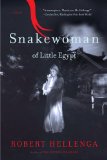Summary | Excerpt | Reading Guide | Reviews | Beyond the Book | Readalikes | Genres & Themes | Author Bio

A Novel
by Robert Hellenga
There were rumors, in fact, that Jackson had done away with
Claude deep in the heart of the Ituri Forest. The rumors weren't
true, of course - Claude had been like a father to Jackson - but it
was impossible to stop them, and they created a certain mystique.
His colleagues in the department joked about it - "Don't mess with
Jackson" - but the important thing was that Warren hadn't believed
the rumors; if he had, he might have killed Jackson. Instead
he took it on himself to look after Jackson the way he'd looked after
Claude.
The prospect of going back to Africa appealed to Jackson. He'd
gone to the Congo when it was still Zaire, just as he was about to start
his third year in graduate school. Some grant money had appeared
out of nowhere, and Claude had tapped him to go along, probably
because he spoke French and because he'd done well in Professor
Steckley's two-semester Swahili course. Though there were others
who had taken the course too and done just as well. Kingwana or
"kitchen Swahili," a Bantu language, was the lingua franca in the
Congo. The Negroes who lived along the edge of the Forest spoke it,
and the polyglot Mbuti spoke it in the villages, though they spoke
a dialect of their own among themselves in the Forest. Jackson
wouldn't say he'd mastered this difficult dialect, but he'd learned it
tolerably well in the four years he'd spent in the Forest. But what
had given him the edge over the other graduate students was the
fact that he played the harmonica, or the blues harp, at department
parties, and Claude had got it into his head that Jackson was an ethnomusicologist who could help him record and preserve the Mbuti
music.
Two and a half years after Claude's death Jackson had been arrested
outside Étienne Rameau's huge mud mansion at Camp Rameau
by two Bantu policemen. They'd been waiting for him to come
out of the Forest for two months. Rumors of Claude's death had
reached the authorities, and the authorities had done what authorities
always do. But suspicion of murder? Assisted suicide, possibly,
though Jackson didn't think the charge would have stuck in a court
of law, and it hadn't come to that. He'd been taken to the American
embassy at Kinshasa. No one wanted an international incident.
Claude was not married but had an illegitimate daughter living in
Lyon. It was the university - Thomas Ford University - that had
wanted to know what had happened to Claude. Had he returned to
France without telling anyone? Had something happened to him?
No one, it turned out, had been inquiring after Jackson.
By the time Jackson was arrested his visa had long expired and
none of his papers were in order. He didn't even have any papers, in
fact. Not the kind of papers that the authorities wanted. Though he
did manage to bring back Claude's notebooks, which Claude had
given to him after Claude's first death in the Forest - before he was
dead once and for all, absolutely and completely dead, as the Mbuti
put it.
What had happened was, Jackson had gone native. He'd had a taste
of something that he didn't think he could live without - ecstasy, or
joy, or maybe simply a settled conviction of well-being, of being at
home in the universe, of being where he belonged - though this
settled conviction was punctuated by periods of incandescent... He couldn't find the words. Perhaps Romain Rolland's oceanic
feeling, though Freud had regarded this oceanic feeling as a delusion.
Had what Jackson experienced been a delusion or an insight?
A fantasy or a vision? But it wasn't like that at all, really. And how
could an oceanic feeling be incandescent? He could still remember
the feeling even if he couldn't name it. His body remembered. His skin remembered the overpowering moist heaviness of the gigantic trees; his eyes remembered the cool shadowy half-light that
spooked the Negro villagers; his ears remembered the birdsong
and the monkey chatter and the night sounds that might or might
not be the cough of a leopard; his nose remembered the smell of the
munu'asulu leaves used to wrap food to be cooked in the embers of a fire and the sweet body odor of the Mbuti men; his tongue remembered the bitterness of liko, brewed from berries and herbs, and the sharp tang of termites - an acquired taste - which provided the Mbuti, as it did our earliest hominid ancestors, with a rich supply of protein.
Excerpted from Snakewoman of Little Egypt by Robert Hellenga. Copyright © 2010 by Robert Hellenga. Excerpted by permission of Bloomsbury. All rights reserved. No part of this excerpt may be reproduced or reprinted without permission in writing from the publisher.
Your guide toexceptional books
BookBrowse seeks out and recommends the best in contemporary fiction and nonfiction—books that not only engage and entertain but also deepen our understanding of ourselves and the world around us.